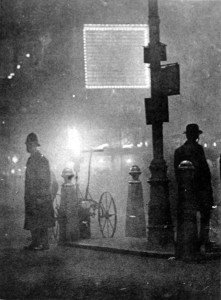December 1924 – Lao She, Harriet Monroe and Huang Zunxian on London’s Smog
Posted: December 9th, 2013 | No Comments »China is enveloped in smog. Of course it wasn’t always that way. In 1924 the young writer Lao She came to London to teach and was shocked by the London smog caused by the dirty air and filthy coal. December 1924 was bad but London had been suffering terrible smogs for decades, as the poet Huang Zunxian recalled in verse after his visit during a London “airpocalypse” in 1890. This section below from Anne Witchard’s RAS China Monograph Lao She in London recalling both their experiences and their shock at having come from the relatively clean skies of Peking back then…
 Piccadilly in December 1924 during one of London’s worst ever “pea soupers”
Piccadilly in December 1924 during one of London’s worst ever “pea soupers”
“Lao She stayed (in London) through the winter of 1924 which saw the worst fog recorded for 34 years, paralysing the entire city. The very idea of London then was inextricable from its ‘pea-soupers’, or ‘London Particulars’, as they were called. Lao She would have probably been familiar with the poem Heavy Fog by China’s renowned poet and Hundred Days reformist, Huang Zunxian (1848–1905), composed during London’s previous record-breaking fog in 1890, when Huang had been attached to the Chinese Embassy in Portland Place:
I sit by myself and write words in the air.

The fog is so dense, London is blacker than lacquer;
The cold is so bitter, it dims my fire.

I raise my head to gaze at a wild goose,

Soaring high in the sky, it rides the wind homeward.
Huang was homesick and Harriet Monroe, visiting London that month, couldn’t wait to leave either: ‘I could not endure the thoughtof life by candlelight in that sooty, cheerless capital where for three weeks I shivered in cold rooms and never once saw the sun.’ Until the Clean Air Act of 1952, each London fog plunged the city back into Victorian gloom. At midday on 9 December 1924, a clammy, yellow, blanket of fog dropped over London with the suddenness of a descending theatre curtain.
For almost a week, the street lamps, electric signs and the headlights of traffic, shed their ineffectual beams as people moved forward using their hands as antennae, like insects. Lao She had a tedious Northern Line commute on ‘the tube’, from High Barnet to Moorgate station, the stop nearest the School of Oriental Studies. He could not afford to buy winter tweeds so made do with the khaki, putting on the additional cardigan ‘only when it was really cold’.”

Leave a Reply